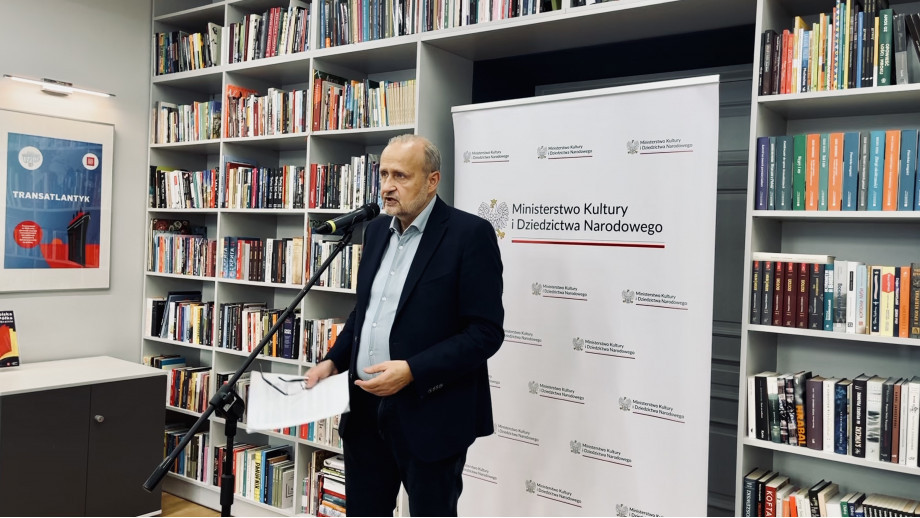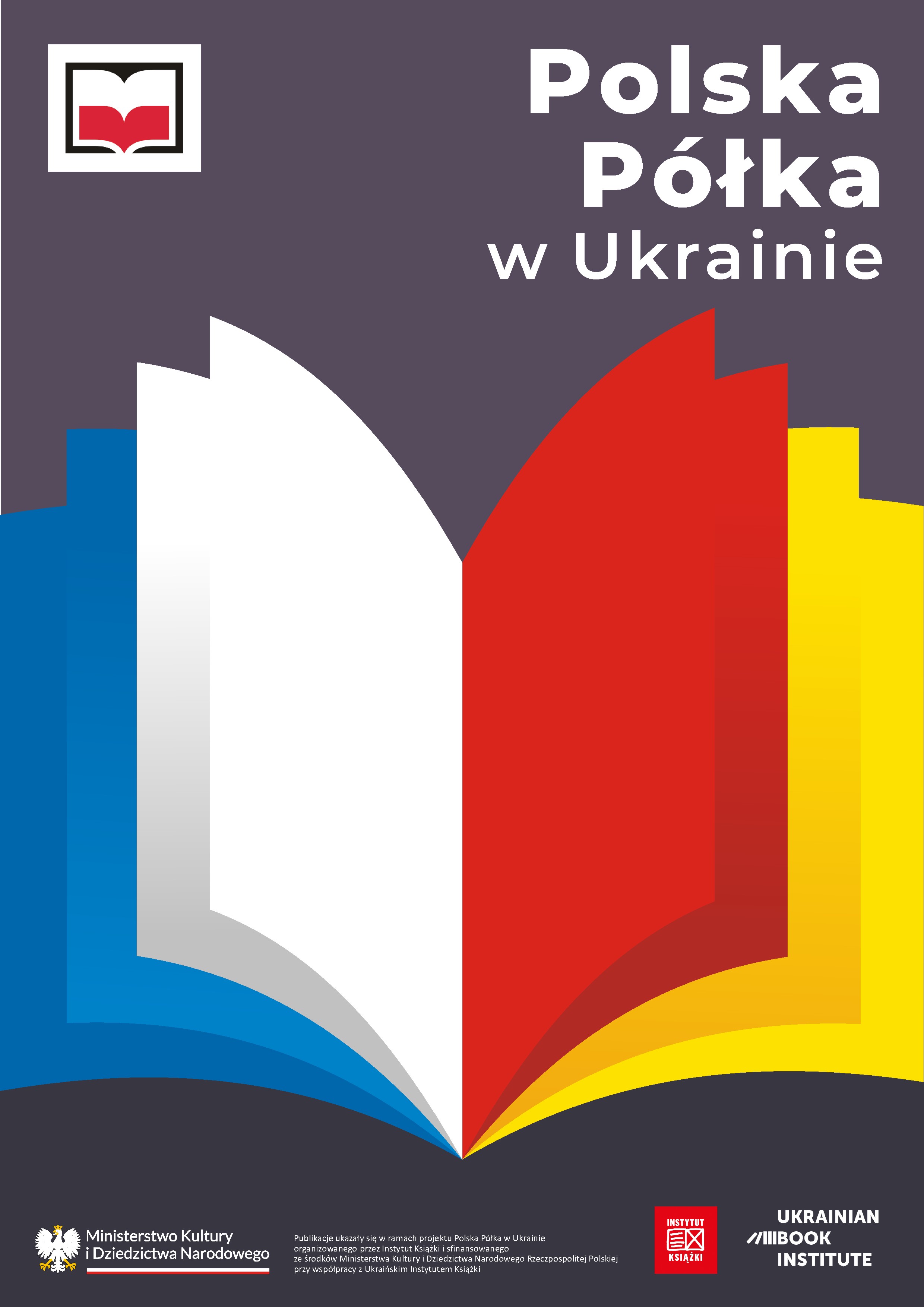News

By the end of the year, almost 30,000 Polish books translated into Ukrainian will have reached 1,420 libraries in Ukraine. The aim of the Ukrainian edition of the Book Institute's Polish Bookshelf project is to reach as many readers as possible, promote knowledge about Poland, our culture and history, shape a positive image of Poland, and support the Ukrainian book market. Readers from across our eastern border will be able to get acquainted with, among others, the works of classics by Józef Czapski, Henryk Sienkiewicz, Zbigniew Herbert, Ryszard Kapuściński, while the youngest will be able to read books by Justyna Bednarek, Janusz Korczak, and Dorota Terakowska. The Ukrainian Book Institute is a partner in the project. The details of the project were presented by the director of the Book Institute, Dariusz Jaworski, at a press briefing last week.
The Polish Bookshelf programme in Ukraine is intended to enrich Ukrainian public libraries with books by Polish authors in Ukrainian, following the withdrawal of Russian-language publications. The Polish Bookshelf is a separate, labelled bookcase in each participating library. It will be a space for encounters with Polish literature, and in the future will become a "starting point" for organising author meetings, lectures on literature or other cultural events connected with Polish literature and culture.
The library infrastructure in Ukraine has been severely affected during the ongoing war with Russia. Even before the war, however, roughly half of the library collection consisted of books published before 1991, in addition in Russian. Exchanging Soviet books and supplementing the collection with valuable titles in Ukrainian translated from European languages became a necessity. Here, the important role of Polish literature was recognised.
"Only about 20% of the books were those that reflected the Ukrainian cultural spirit and identity," - Director Dariusz Jaworski pointed out. He added that after the outbreak of the war, the Ukrainian authorities decided to "cut this knot of the centuries-long colonisation of Ukrainian culture by Russian influence" and to stop "the process depreciating Ukrainian culture".
"After that, practically speaking, what was left were empty shelves," said the director of the Book Institute. “We have proposed that we can partially fill these deficits, however, we will not act as new colonisers, but, through Polish literature, we will build an element of reconciliation, relations, and perhaps a new community between Poland and Ukraine," he added.
The Book Institute has prepared a list of books to be donated to Ukrainian libraries by the end of the year. It includes titles that have been published previously in Ukrainian and are now being reissued with the label of the 'Polish Bookshelf in Ukraine' programme. The books were published by nine Ukrainian publishers, printed in Ukraine, and are distributed to libraries across Ukraine. They will not go on sale on the open market - they have been reissued for the programme's use only, and publishing, printing, and distribution through Ukrainian publishers and companies will help to support the book market there in a significant way.

The Book Institute's partner in the project is a fellow Ukrainian institution: the Ukrainian Book Institute. The call resulted in many more establishments signing up to the programme than originally anticipated. Ultimately, the books will go to 1,420 Ukrainian libraries. Each library that joins the project will receive a set consisting of 20 books by Polish authors (larger libraries will receive 2 packs). Among the titles that will be available in libraries are classics of Polish literature (Henryk Sienkiewicz, Stefan Grabiński), books for children and young adults (Janusz Korczak, Katarzyna Ryry, Justyna Bednarek, Dorota Terakowska), as well as books on topics important to both Poles and Ukrainians, including Stanisław Vincentz's Dialogi z Sowietami (“Dialogues with the Soviets”), Józef Czapski's Na nieludzkiej ziemi (“The Inhuman Land”), and Witold Szabłowski's reportage on Volhynia.
During the press briefing combined with the presentation of the programme, a recording was also played in which the director of the Ukrainian Book Institute, Oleksandra Koval, stressed that 'Ukrainian libraries need immediate decolonisation, as most of the translations of foreign literature (including Polish) in their collections are translations into Russian'.
"And this is how our joint idea of an aid campaign for Ukrainian libraries and Ukrainian readers was born. We decided, with the support of the Polish Ministry of Culture and the Book Institute, to publish translations of works of Polish literature into Ukrainian and distribute them in libraries so that people could reach for them in their spare time during the difficult times of fighting the enemy," she said.
She also pointed out that Germany and Austria have confirmed funding for a similar project, and several other governments are considering it. "What is important, however, is that it was Poland that was first,” Oleksandra Koval added.
As part of the programme, 17 titles in 20 volumes (including the complete Sienkiewicz The Trilogy in six volumes) were published in 2023, each with an edition of 1,500 copies. Nine Ukrainian publishers are participating in the programme: Folio, Bohdan, Anetty Antonenko, Publishing House 21, Znannia, Apriori, Urbino, Astrolabia, Old Lion Publishing House, and in total, almost 30,000 books will be distributed to Ukrainian libraries as part of this year's project.
The project is implemented from the state budget, with funding from the Ministry of Culture and National Heritage. The partner of the Book Institute in the project is the Ukrainian Book Institute.

---
The Polish Bookshelf project was first implemented by the Book Institute in 2017 in the UK. In 2019, the project was carried out in the United States - at that time 'Polish bookshelves' appeared in libraries in Brooklyn, New York, and Philadelphia. In 2021, Ukraine joined the programme. At that time, more than 1,200 books by Polish authors were donated to 26 Ukrainian libraries through Polish diplomatic missions. The project aims to bring Polish literature to readers - foreign and Polish - in various countries around the world through local public libraries, to promote knowledge of Poland, Polish culture and history, and to shape a positive image of Poland.